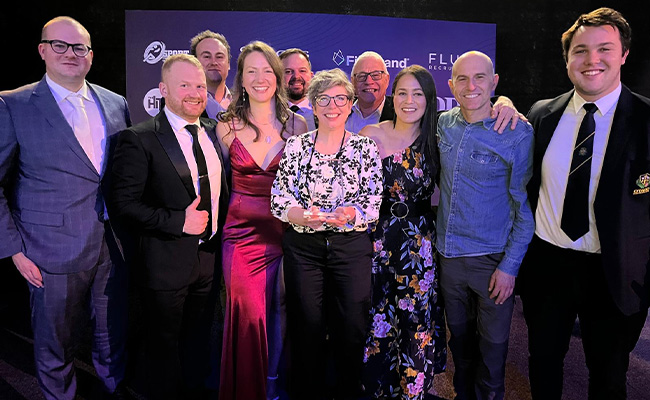
At the Otago Sports awards with Melanie in the middle
The Otago Community Head Impact Detection study (ORCHID), a joint project between World Rugby, Prevent Biometrics, New Zealand Rugby, Otago Rugby and the University of Otago, won the Innovation in Sport award at this year's Otago Sports awards.
Study lead Otago alumna Associate Professor Melanie Bussey (PhD, 2005) says, “Being nominated for the award by the sports community was incredibly rewarding. This recognition reflects the strong collaborative effort with many community organisations and it resonated deeply with many people.”
Melanie is Director of the Motion Analysis Research Lab at the School of Physical Education, Sport and Exercise Sciences. Other alumni involved in the project include New Zealand Rugby Research Analyst Danielle Salmon (PhD, 2014), Faculty of Dentistry Professor Darryl Tong (BDS, MB ChB, PhD) and Professor Gisela Sole (PhD, 2008) from the Otago School of Physiotherapy.

The University of Otago ORCHID team with Melanie in the middle
The project was initially mooted by World Rugby. Melanie says, “World Rugby Chief Medical Officer Éanna Falvey was eager to explore the issue of head impacts in youth rugby to better inform decisions regarding youth contact guidelines. New Zealand being the ‘cradle of rugby’, they came to us to carry out the research.”
Melanie’s team are still researching head impacts in close contact with World Rugby. A new study with female youth rugby players is about to start in collaboration with Gisborne’s MATAI Research Institute, which will include repeat MRI scans to monitor brain recovery.
“We have been monitoring some of these players continuously since 2021. As a result, the parents are really invested in the work and have requested a longitudinal study of cohorts involved in the research. Longitudinal research is invaluable; just consider what we have learned from the Dunedin Study. It is our hope to one day have the same continuity of study occurring with our rugby community.”

Melanie speaking at the awards
ORCHID published the first independent, peer-reviewed findings into community rugby following almost two years of research. The study measures more than 17,000 separate head acceleration events across more than 300 players from senior rugby through to under 13 level.
This work was followed by the Elite Extension of the ORCHID study in partnership with Ulster University and Premiership Rugby. Further updates into the women’s community game are currently under peer review and publication.
Melanie says both studies used smart mouthguard technology, supplied by Prevent Biometrics, to understand the forces on the head experienced by players both in matches and training situations. The mouthguards measure g-forces which are experienced for less time than it takes to blink, using technology independently verified both in research laboratories and on the field of play.